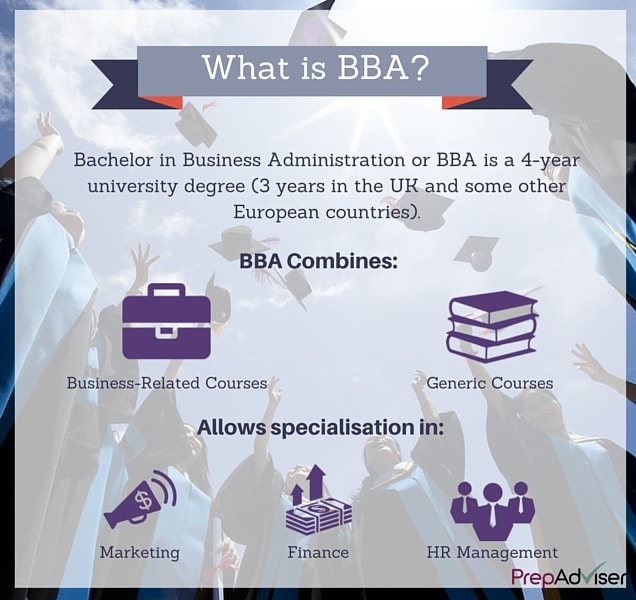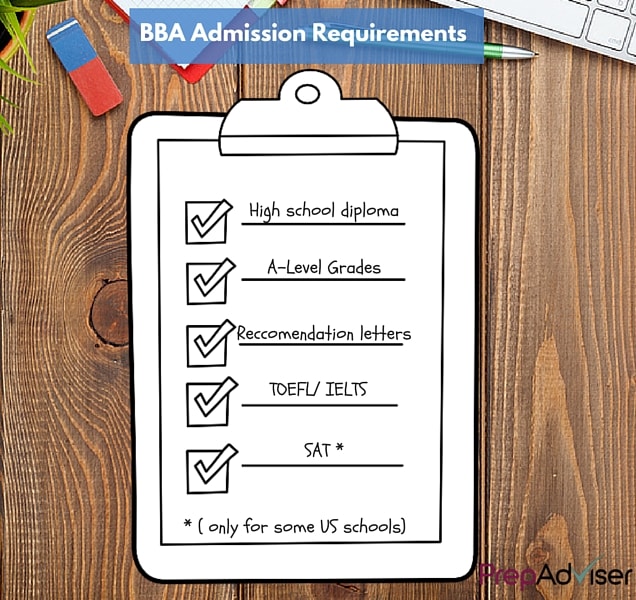Usually spanning a period of three to four years, depending upon the country you study in, the BBA degree enables students to explore all aspects of the business industry and equips them with skills that are essential for entrepreneurs and business managers.
This article will help you explore what a BBA is, what is taught and how it is taught, career prospects, admission requirements in different continents, and whether choosing an MBA after a BBA is a feasible option.
What is a BBA degree?
BBA stands for Bachelor in Business Administration and is usually a 4-year university degree (3 years in the case of the UK and some other European countries), consisting of a combination of business-related and generic courses preparing a student for several different career paths.
Usually, the BBA degree allows students to specialise in a particular discipline, of which the most common are Marketing, Finance and Human Resource Management.

The foundation year provides students with an overview of different subjects within the business discipline and then allows them to choose an area of specialisation in subsequent years. Some degree programmes also allow students to choose a minor with a major discipline in order to provide a unique specialisation. For example, a BBA degree may offer a Major in Marketing with a minor in Media Studies.
BBA curriculum and teaching methods
As mentioned before, the BBA consists of a combination of generic and specific courses which are designed to equip a student for different career paths in the future. However, generally speaking, through the course of their studies, students will cover aspects of all business-related disciplines such as marketing, management, human resource management, finance, economics, and several IT and communication skills courses.

The curriculum may vary slightly from university to university but generally includes courses such as Managerial Accounting, Operations Research, Business Law, Microeconomics, Risk Management, Consumer Behaviour, and other similar disciplines.
Teaching methods may vary from an emphasis on theory and coursework to presentations and group projects in order to instil a practical element into the programme. Some BBA programmes may also provide placement opportunities during summer.
Most BBA programmes are highly interactive and hands-on, equipping students with the necessary skills to optimise communication, enhance negotiation skills, and providing them with enough confidence to become effective business managers and entrepreneurs.
In case you are wondering if you have the entepreneurial mindset, you might also check The 15 Characteristics of Effective Entepreneurs (Video).
Career prospects
One of the best reasons for completing a BBA degree is that it opens doors to numerous career paths in the future. While BBA graduates may opt for business-related disciplines and career paths such as Sales and Marketing, General Management, Banking, Real Estate, Trade and Advertising, working as Business Analysts and Consultants, Marketing Managers, Financial Analysts and Accountants, they can also opt for other generic career paths such as teaching.

There is also the highly attractive option of starting your own business!
Admission requirements
According to the American University of Beirut, for admission into the BBA programme in North America, applicants must generally have completed A-levels, high school, or college with approximately 70% marks to get into a good school. The admission criteria varies from university to university, yet most North American universities ask for a sound academic record, two recommendation letters, a TOEFL score (for foreign applicants), and some also require a SAT score.
If you are planning to apply in a US Business school, you should check this article about The Student Visa - What You Should Know.
According to the EU Network and the European School of Munich, admission into the BBA programme in Europe, including the UK, does not usually require a SAT score but foreign applicants must be able to demonstrate fluency in English, by showing at least a score of 6.0 bands in IELTS or a TOEFL score of 213 (computer-based), or equivalent. Applicants must also have a high school diploma or equivalent and some schools may ask for at least 60% or more (or equivalent in grades) for admission into a BBA programme.
Admission requirements in Asia for BBA programmes vary from country to country, as stated by CollegesWorld.com. However, most universities in Asia require the completion of high school/A-levels or equivalent for admission into a BBA programme. As most countries in Asia are not English-speaking, universities usually do not require an English fluency test for applicants. Regardless, some high-ranking universities have their own admissions test in which they assess a candidate’s English and Maths skills before accepting them as students.

Most universities internationally follow up the application process with an interview in which the candidate discusses his/her abilities and future plans with an admissions committee or the Dean.
You may also find interesting to learn which are The Best Student Cities for Business Education.
MBA after BBA
Many people claim that those who have completed a BBA do not need to reiterate the same subjects in an MBA, according to MBAdiscussions.com. However, many BBA students do opt for an MBA after the completion of their degrees in order to polish their skills, change their specialisation, or enhance their understanding of the business discipline.
Some universities allow students who have completed a BBA in their own university to complete an MBA in a shorter time span (for example reducing a two-year degree to a one-year degree for BBA graduates). However, other MBA programmes are more rigorous and require BBA students to complete the full two-year programme, says the WallStreetOasis.
So the BBA degree remains a highly attractive option for undergraduate studies! If you are planning on pursuing a business degree, you might as well take the plunge!




